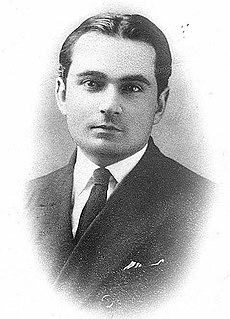 W
WXavier Abril de Vivero, was a Peruvian poet and essayist who devoted time studying the poetry of César Vallejo
 W
WJosé María Arguedas Altamirano was a Peruvian novelist, poet, and anthropologist. Arguedas was an author of Spanish descent, with a rare fluency in the native Quechua language, gained by living in two Quechua households from the age of 7 to 11 - first in the indigenous servant quarters of his step-mother's home, then, escaping her "perverse and cruel" son, with an indigenous family approved by his father - who wrote novels, short stories, and poems in both Spanish and Quechua.
 W
WJorge Basadre was a Peruvian historian known for his extensive publications about the independent history of his country. He served during two different administrations as Minister of Education and was also director of the Peruvian National Library.
 W
WMarco Aurelio Denegri Santagadea was a Peruvian intellectual, literary critic, television host and sexologist.
 W
WEric Frattini is a Spanish essayist, novelist, journalist, college professor, political analyst, television screenwriter, and lecturer.
 W
WJose Manuel de los Reyes González de Prada y Ulloa was a Peruvian politician and anarchist, literary critic and director of the National Library of Peru. He is well remembered as a social critic who helped develop Peruvian intellectual thought in the early twentieth century, as well as the academic style known as modernismo. He was close in spirit to Clorinda Matto de Turner whose first novel, Torn from the Nest approached political indigenismo, and to Mercedes Cabello de Carbonera, who like González Prada, practiced a positivism sui generis.
 W
WJosé Carlos Mariátegui La Chira was a Peruvian intellectual, journalist, activist and political philosopher. A prolific writer before his early death at the age of 35, he is considered one of the most influential Latin American socialists of the 20th century. Mariátegui's Seven Interpretive Essays on Peruvian Reality (1928) is still widely read in South America, and called "one of the broadest, deepest, and most enduring works of the Latin American century". An avowed self-taught Marxist, he insisted that a socialist revolution should evolve organically in Latin America based on local conditions and practices, not the result of mechanically applying a European formula. Although best known as a political thinker, his literary writings have gained attention by scholars.
 W
WClorinda Matto de Turner was a Peruvian writer who lived during the early years of Latin American independence. Her own independence inspired women throughout the region as her writings sparked controversy in her own culture.
 W
WGonzalo Javier Enrique Portocarrero Maisch was a Peruvian sociologist, social scientist and essayist.
 W
WAmalia Natividad de las Mercedes Puga y Puga, best known as Amalia Puga de Losada, was a Peruvian writer, poet, novelist, essayist and storyteller. She was included as a member of the "Círculo Literario" in 1887 and of the "Ateneo de Lima" in 1891.
 W
WDiego Valverde Villena, born on April 6, 1967, is a Spanish poet of Peruvian origin and Bolivian roots.
 W
WJorge Mario Pedro Vargas Llosa, 1st Marquis of Vargas Llosa, more commonly known as Mario Vargas Llosa, is a Peruvian writer, politician, journalist, essayist and college professor. Vargas Llosa is one of Latin America's most significant novelists and essayists, and one of the leading writers of his generation. Some critics consider him to have had a larger international impact and worldwide audience than any other writer of the Latin American Boom. In 2010 he won the Nobel Prize in Literature, "for his cartography of structures of power and his trenchant images of the individual's resistance, revolt, and defeat."
 W
WGastón Antonio Zapata Velasco is a Peruvian historian, professor and columnist, known for his investigations and articles about the history and sociopolitical reality of Peru.